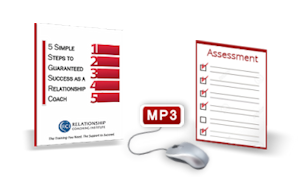 What does the word “Coach” mean to you?
What does the word “Coach” mean to you?
More importantly, what do you think it means to others?
These are important questions for anyone considering relationship coach training and certification.
To the average person, when you say “I’m a Coach” they might translate that to:
- I’m like a personal trainer, a fitness expert who will design your exercise plan and lead you towards your goals.
- I’m like a sports coach, an expert in a particular sport and will direct you to improve your skills and win.
- I’m like a consultant, an expert in a particular field and can provide the answers and solutions you need to solve your problems.
- I’m like a therapist and listen empathetically and support you to feel good about yourself and your life.
- I’m like Tony Robbins, an expert and guru in my field and if you follow my advice you will be successful.
- I’m like a teacher who will provide you the knowledge and information you need to achieve your goals.
See the problem? In my opinion, none of the above is anywhere near an accurate description of coaching.
Unless you know and understand the methodology of Professional Coaching as its evolved in the past 20 years, it’s almost guaranteed that whenever you use the word “Coach” you will not be on the same page as the person on the other side of that conversation.
It gets even worse when new coaches try to explain coaching by saying “Coaches don’t give advice” and “You have the answers inside you,” which, understandably, would cause most people to wonder “Really? Then why would I want to hire you!!??”
The word “Coach” is common in the English language and it’s unfortunate that the early pioneers of the coaching profession chose a label that causes so much confusion about what Professional Coaching is, especially personal, life, and relationship coaching. But here we are, and those of us passionate about this unique and powerful helping methodology have to adapt to the world’s confusion and pre-conceived notions about what we do.
For this reason I recommend that trainees and graduates of RCI:
- Do not use the word “Coach” or “Coaching” in their marketing.
- Do not try to explain coaching!
- Focus on communicating the benefits and results you provide, not how you provide them.
- Sell programs, not sessions.
- Respond to the various iterations of “What do you do?” with your laser speech, such as “You know how hard it is for singles to date in today’s world? I help frustrated singles find the love of their life and live the life that they love.”
Coaching is like magic in that it’s best experienced and not explained. Coaching can help the client overcome huge obstacles and achieve seemingly impossible results in an amazingly short time, more so than any other helping methodology. Coaching is actually pretty simple, but takes training, practice and mentoring because it is not easy to master.
For more information about the methodology of Professional Coaching and how it works:
- Empowerment Coaching vs. Sports Coaching
- The Coaching Superpower
- Coaching Skills Critical Thinking Quiz
- The Nuances of the Coaching Agenda
- The Role of Feelings and Emotions in Coaching
- What It Takes to be a Good Coach
- A Case Against Using the Word “I” in Coaching
- Five Steps of an Effective Coaching Session
- What is Relationship Coaching? (includes comparison of coaching and therapy)
- Top Ten Guidelines of Coaching
Even within the coaching profession there are differences of opinion about exactly what coaching is and how to do it, so the information and perspectives that we provide here at RCI are not universally agreed upon within our own industry, creating additional confusion!
For this reason, in RCI’s relationship coach training and certification programs we ask our trainees to put aside their preconceptions about coaching and allow us to train them in our methodology to get the full benefit from our training, and if they want to do something different when they graduate they are completely free to do so.
In my opinion, true coaches are humble and value service over ego. They are always aware that there are many possible perspectives, all perspectives are valid, and that there is no dogma in coaching, including about coaching! This is incredibly empowering but also confusing to anyone seeking to understand coaching, considering becoming a coach, and/or seeking relationship coach training and certification, so I sincerely hope this article has been helpful to you.

